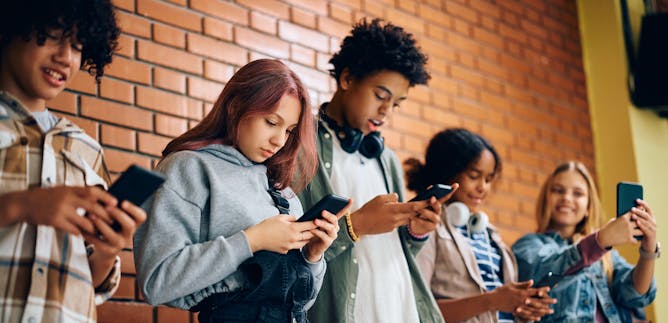|
|
|
|
Recently, I’ve read stories about people swapping out their smartphones for “dumb” ones to try and curb their addiction to social media apps. Personally, since I’ve lived through the era of having to type my texts using number keys (#2 = ABC) into a mini blue Nokia when I was in grad school, I don’t think I’ll be going back to that. But I know the possibility of addiction is real. Many of us are over-connected to our phones. This holds true whether you are a “digital native” — born into technology or a digital immigrant. It’s hard enough to resist the draw of the smartphone as an adult, but the pull is even harder to resist for children.
Research shows social media apps are designed to entrap children who are even more susceptible to its harms. Plus, technologies are not neutral: They’re embedded with and actively reinforce structures of racism. A recent survey of Canadian children in grades 7 to 11 found nearly half of participants reported seeing racist or sexist content online, and youth from marginalized groups were more likely than others to encounter this type of content. So, what’s to be done?
Five school boards in Ontario have recently sued four major social media platforms. The Ontario premier has called the lawsuit a waste of time and money, and announced its government is doubling down on a 2019 ban on cell phones in schools as a way to address the problem. It also pledged $30 million to a surveillance program they think will help solve problems in schools, like cell phone and vape addictions.
On this week’s Don’t Call Me Resilient podcast, two education researchers, Beyhan Farhadi of the Ontario Institute for Studies in Education, University of Toronto and Kisha McPherson of Toronto Metropolitan University get into it. The two former teachers say social media is here to stay and instead of banning phones and spending money to monitor what children are doing, their role as educators should be to help students learn to live with — and beneficially use — technology in a healthy way. They give listeners much to think about.
Also today:
All the best.
|

|
Vinita Srivastava
Host + Producer, Don't Call Me Resilient
|
|

Five Ontario school boards are suing the companies behind major social media platforms Facebook, Instagram, Snapchat and TikTok, alleging their addictive products have caused the students to suffer from mental health issues, and causing widespread damage and disruption to the education system.
Vinita Srivastava, The Conversation; Ateqah Khaki, The Conversation; Catherine Zhu, The Conversation
Is a cellphone ban, along with increased surveillance, the right way to deal with the impact of addictive and harmful technology in classrooms?
|

Jay Park, right, of K-pop band Enhypen, who was born in Seattle, prepares to throw ceremonial first pitches with bandmates before a Seattle Mariners game, April 29, 2024, in Seattle.
(AP Photo/Lindsey Wasson)
Tae Yeon Eom, University of British Columbia
New K-pop groups comprised entirely of North Americans, Korea’s ‘K-culture training visa’ to attract international participation and K-pop auditions in Canada are all signs of a K-pop evolution.
|

Prime Minister Justin Trudeau speaks during an announcement on innovation for economic growth in advance of the 2024 federal budget in Montréal in April 2024.
THE CANADIAN PRESS/Graham Hughes
Wendy H. Wong, University of British Columbia
Governments should play to their existing strengths in data collection to make AI safer for their citizens, including assessing what kinds of data are too risky to allow private companies to collect.
|

Only two Canadian provinces have published policy proposals for dealing with future pandemics.
(Shutterstock)
Christopher Bruce, University of Calgary
To minimize the effects of future pandemics, it is not enough that we recognize deficiencies in our responses to COVID-19; we must start to build policies for the next pandemic as soon as possible.
|

Aamjiwnaang children celebrate Indigenous peoples’ day on the community baseball field across from Ineos Styrolution.
(Laurence Butet-Roch)
Sarah Marie Wiebe, University of Victoria; Alexandra Bridges; Leah Levac, University of Guelph
The federal government’s proposed Bill C-226 could be an important first step in addressing environmental racism, but only if communities are involved.
|

Columbia University students express their solidarity with Palestinians at a protest on April 30, 2024.
Mary Altaffer-Pool/Getty Images
Mira Sucharov, Carleton University
There’s been a concerted effort in Israel and the US to block this movement’s tactics and goals.
|
La Conversation Canada
|

Vue des montagnes de l'Himalaya près du parc national de Sagarmatha, au Népal.
(Shutterstock)
Nita Dyola, Université du Québec à Chicoutimi (UQAC); Sergio Rossi, Université du Québec à Chicoutimi (UQAC)
L’Himalaya est un écosystème magnifique et fragile dont les humains et les non-humains dépendent depuis des millénaires. Pour le protéger, il faudra déployer d'importants efforts de conservation.
|
Podcasts
|
-
Gemma Ware, The Conversation
Daniel Angus, a professor of digital communication, explains how artists are trying out data poisoning to protect their intellectual property. Listen to The Conversation Weekly podcast.
|
|
Health
|
-
Christian Brakenridge, Baker Heart and Diabetes Institute
A new study has calculated how long you should be sleeping, standing and moving each day for optimal health. And you might be doing more physical activity than you thought.
|
|
Politics
|
-
Lisa Sugiura, University of Portsmouth
Women are overwhelmingly the victims of sexualised violence, and men are commonly the perpetrators.
|
|
Science + Tech
|
-
Seán Jordan, Dublin City University; Louise Gillet de Chalonge, Dublin City University
The origin of life on Earth is one of the biggest mysteries in science.
|
|
|
|
| |
| |
| |

|
| |
| |
| |
| |
| |
| |
|
|
|
|
|
|
|